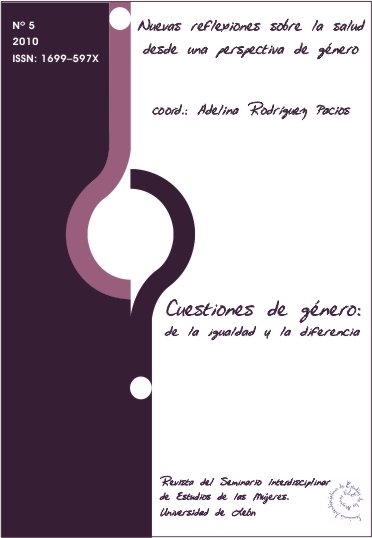Feminism and disability
DOI:
https://doi.org/10.18002/cg.v0i5.3795Keywords:
discapacidad, feminismo, mujer, exclusión, capacidades, asistencia, inclusión, justicia, horizontalidad, devaluación, sociedad, ciencia, salud, tradición, problemas, igualdadAbstract
Historically, disability was associated to defective, imperfect, etc. The society, far from assume the problem of disability, reduced it to the scope of the individual, refusing to assume the part of responsibility that it‘s entitled. Meanwhile, philosophers and scientists, in their search of the ―universality‖, before the problem of the disability, uttered the charge of marginal, coining the term ―normal‖ as a paradigmatic basis of a patriarchal pseudoscience that, in a parallel way, printed on woman the image of naturally incomplete and disabled, inferior to man in intelligence and morals, relegating her to care work. Some feminist approaches, recognizing parallelisms with the problem of disability, far from ignoring, assume it, being better off with it, by opting for liberation and inclusion in their broadest dimensions.
Downloads
Métricas alternativas
References
Aristóteles (2005). Política. Madrid: Alianza.
Barton, L. (ed.) (1998): Discapacidad y sociedad. Madrid: Morata.
Campoy Cervera, I. (2004): Los derechos de las personas con discapacidad: Perspectivas sociales, políticas jurídicas y filosóficas. Madrid: Dykinson, S.L.
Casado, D. (1991): Panorámica de la discapacidad. Barcelona: Intress.
Di Nicola, J. P. (1991): Reciprocidad hombre-mujer. Igualdad y diferencia. Madrid: Narcea.
Foucault, M. (1992): Vigilar y Castigar: el nacimiento de la prisión. Madrid: Siglo XXI.
Gafo, J. (1990): Eutanasia: el derecho a una muerte humana. Madrid: Temas para Hoy.
Gough, I. (2007): El enfoque de las capacidades de M. Nussbaum: un análisis comparado con nuestra teoría de las necesidades humanas. En Papeles de relaciones eco sociales y cambio global, nº 100, pp.177-202.
Homero (2005): Ilíada. Barcelona: Anagrama.
Hume, D. (2008): Tratado de la naturaleza humana: autobiografía. Madrid: Tecnos.
Lecourt, D. (1984): La historia epistemológica de Georges Canguilhem. En Canguilhem, G.: Lo normal y lo patológico. Buenos Aires: Siglo XXI.
Madrid, M. (1999): La misoginia en Grecia. Madrid: Cátedra.
Mukhopadhyay, M. y Singh, N. (2008). Justicia de género, ciudadanía y desarrollo. Bogotá: Mayol.
Nussbaum, M. (2000): Women and human development. Cambridge: Univ. Press.
Nussbaum, M. (2007): Las fronteras de la justicia. Barcelona: Paidos.
Platon (2003): República. Madrid: Alianza.
Rawls (1997): Teoría de la justicia. Madrid: Fondo de Cultura Contemporánea.
Rousseau (1995): Emilio o de la educación. Madrid: Alianza.
Sen, A. (1985): Commodities and capabilities. Amsterdam: North-Holland.
Silvers, A.; Wasserman, D. y Mahowald, M. (1998): Disability, Difference, Discrimination: Perspectivas on Justice in Bioethics and Public Policy. Lanham: Rowman and Littlefield Publishers
Downloads
Published
How to Cite
Issue
Section
License
Copyright (c) 2010 José Luis Sánchez Tierra

This work is licensed under a Creative Commons Attribution-NonCommercial-ShareAlike 4.0 International License.
L@s autores/as que publican en esta revista están de acuerdo con los siguientes términos:
1. L@s autores/as ceden de forma no exclusiva los derechos de explotación (reproducción, distribución, comunicación pública, transformación) a la Universidad de León, por lo que pueden establecer, por separado, acuerdos adicionales para la distribución no exclusiva de la versión de la obra publicada en la revista (por ejemplo, alojarlo en un repositorio institucional o publicarlo en un libro), con un reconocimiento de su publicación inicial en esta revista.
2. Este trabajo se encuentra bajo la Creative Commons Attribution-NonCommercial-ShareAlike 4.0 International License. Puede consultarse desde aquí la versión informativa y el texto legal de la licencia.
3. Se permite y se anima a l@s autores/as a difundir electrónicamente las versiones pre-print (versión antes de ser evaluada) y/o post-print (versión evaluada y aceptada para su publicación) de sus obras antes de su publicación, ya que favorece su circulación y difusión más temprana y con ello un posible aumento en su citación y alcance entre la comunidad académica.
Cuestiones de Género utiliza exclusivamente la licencia Atribución-NoComercial-CompartirIgual 4.0 Internacional (CC BY- NC-SA 4.0).
Bajo los siguientes términos:
- Atribución: Usted debe dar crédito de manera adecuada , brindar un enlace a la licencia, e indicar si se han realizado cambios . Puede hacerlo en cualquier forma razonable, pero no de forma tal que sugiera que usted o su uso tienen el apoyo de la licenciante.
- No Comercial: Usted no puede hacer uso del material con propósitos comerciales .
- Compartir Igual: Si remezcla, transforma o crea a partir del material, debe distribuir su contribución bajo la la misma licencia del original. cualquier uso permitido por la licencia.
No hay restricciones adicionales — No puede aplicar términos legales ni medidas tecnológicas que restrinjan legalmente a otras a hacer
L@s autores/as pueden consultar los derechos de copyright y las condiciones de autoarchivo en el directorio Dulcinea.











